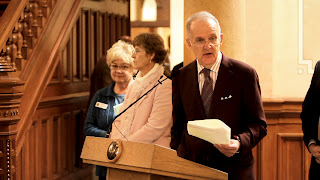Among organizations partnering with the Center for Cowboy
Ethics and Leadership, the University of Wyoming College of Business is right
at the top of the list. Beyond
working with the Center to develop Standing
Tall in an Upside-Down World, a business ethics program based on the Code
of the West, the College has become the driving force behind the initiative,
working with the Wyoming Chamber Partnership to offer half-day workshops to business
managers and owners.
In addition to leading the program, Kent Noble, Assistant Dean
of the College, plays a hands-on role as workshop leader. He has also created an active blog for
the program along with a “Community of the Code” for graduates. He recently gave us his perspective on
the effort.
Kent, you and the College have invested substantial time and resources in
this project. Why did the College
decide to become so deeply involved?
The program came about because of all the excitement
generated by the premiere of Jim Owen’s film, The Code of the West: Alive and Well in Wyoming, and the state’s
subsequent move to adopt the Ten Principles of Cowboy Ethics as the official
state code. The Wyoming Chamber
Partnership, the umbrella organization for all Wyoming chambers, caught the
fever. They approached the Center
and the College, asking us to consider creating a program for business managers
and owners. We thought it was a
great idea, and our administration and board have been completely supportive. In fact, our board members have gone through the program
themselves.
As for our motivation, I’d say that meeting the needs of
Wyoming’s business community is indeed part of the College’s job. The program is also a great outreach
vehicle for us. What better way to
build relationships with Wyoming’s business leaders?
How many have taken the training so far?
About a hundred business managers and owners have
participated in three sessions to date.
We have two more scheduled in the next month alone, and we’ve been
contacted by other companies that are interested. It seems that every time we do a program, another
opportunity pops up.
What reactions are you getting? Do you encounter a lot of skepticism?
I get the sense that many people coming to the workshops aren’t
quite sure what they’re in for. In
the sessions we do talk about personal principles as well as organizational ethics. Many participants express surprise at how
much meaning they find in the discussions. The Ten Principles of the Code of the West are such that
they register at the core, and when people start to talk about the principles
that are meaningful to them personally…well, often they really open up to each
other. It’s a great thing to
see.
It can all get pretty emotional. One of the things we talk about in the sessions is the
Wyoming Youth Initiative, as an opportunity for businesses to get involved with
their communities. When we show
them what the Center and the Boys and Girls Clubs of Central Wyoming are doing
to help young people build a stronger foundation for their lives, people are
genuinely touched. Every time we show the film clip of young people talking
about their own 11th Principles, I get emotional myself .
How are graduates putting the program into action in their businesses
and communities?
A good chunk of the workshop focuses on ideas for putting
individual and company codes into action, and I expect we’ll be hearing a lot
more about exactly how program graduates are doing that. While we invite people to pledge to
“live their codes,” we encourage them not
to sign if they aren’t sure they can put their principles into action. As we say, it’s not about having a
code, but about living it.
That said, after the last workshop, I got an e-mail from a
senior bank executive in Jackson, saying “I can’t wait to put my principles
into action.” That makes me feel
like we’re really making a difference.
Even if we only reach a few in each session, the ripple effects can be
enormous.
Do you believe this program could grow beyond Wyoming? Could it work elsewhere in the same
kind of format?
Yes, absolutely ; I’m convinced a program like this could be
effective in Colorado or New Mexico or any other state. By way of evidence, one of the
inquiries I’ve recently received is from a California company that would like
to put its entire leadership team through the program. While we think Wyoming is a special
place that’s naturally attuned to the Code of the West, being in a Wyoming is a
point of pride, not a prerequisite.
What does this effort mean to you personally?
That’s an easy one to answer. It’s been thirty years since I graduated from the University
of Wyoming, and in my career I’ve had the opportunity to do so many things that
are challenging and rewarding.
Yet it took me all this
time to figure out what my true passion is. The fact that this program is making a difference in
people’s lives is so incredibly powerful and rewarding to me personally—especially
the ability to connect businesspeople with youth who need help. I feel so strongly about the work that
I would do it even if I weren’t being paid for it. My fondest wish is for this program to grow wings and really
take off.
Kent Noble can be
e-mailed at knoble@uwyo.edu.
For more information on the Standing Tall program, please visit its
website at http://www.uwyo.edu/business/standing-tall/ and the program blog at http://www.communityofthecode.blogspot.com/.

